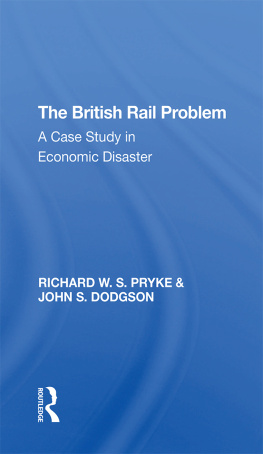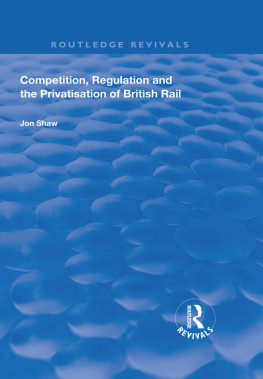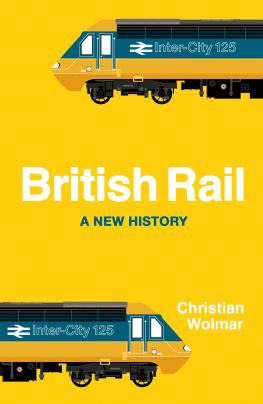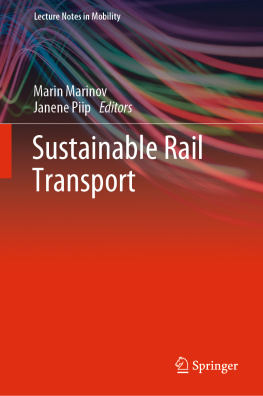First published 1975 by Westview Press
Published 2019 by Routledge
52 Vanderbilt Avenue, New York, NY 10017
2 Park Square, Milton Park, Abingdon, Oxon OX14 4RN
Routledge is an imprint of the Taylor & Francis Group, an informa business
Copyright R. W. S. Pryke and J. S. Dodgson 1975
All rights reserved. No part of this book may be reprinted or reproduced or utilised in any form or by any electronic, mechanical, or other means, now known or hereafter invented, including photocopying and recording, or in any information storage or retrieval system, without permission in writing from the publishers.
Notice:
Product or corporate names may be trademarks or registered trademarks, and are used only for identification and explanation without intent to infringe.
Library of Congress Cataloging in Publication Data
Pryke, Richard.
The British Rail problem.
Includes bibliographical references and index.
1. British Railways. 2. Railroads Great Britain
Finance. 3. Transportation and state Great Britain.
I. Dodgson, J. S., joint author. II. Title.
HE3017.P78 385.0941 7530589
Typeset by Trade Linotype Ltd., Birmingham, Great Britain
ISBN 13: 978-0-367-29042-9 (hbk)
THE BRITISH RAIL PROBLEM
A Case Study in Economic Disaster
With BR's deficit approaching 500 million per annum a book on the rail problem needs no justification. What however is necessary is to explain how we obtained the information on which it is based. A considerable amount of factual material was gleaned from published sources and in particular from official publications, the annual reports of the Railways Board and other nationalised industries, and from railway journals and the trade press. But our main source of information was 70 interviews and meetings, 170 telephone conversations and the 56 letters and documents that we received.
In all we made contact with 203 people many of whom provided us with facts and figures on a number of occasions. Of these individuals 43 were in British Rail (with whose employees we had 33 interviews and meetings), 16 were in the electricity industry, 8 worked for the National Freight Corporation, 7 for BSC, 5 for the Coal Board, 5 for Passenger Transport Executives, 4 for London Transport, 2 for the Post Office, and 1 each for British Airways and the National Bus Company. We also obtained information from 4 individuals in the private sector of road transport and the Road Haulage Association.
Besides those concerns within the public sector that have already been mentioned we were also helped by a large number of rail users and customer industries. We were provided with facts and figures about cement and other building materials by 15 persons employed by Associated Portland Cement, the Cement Makers Federation, Foster Yeomans, English China Clays, the Sand and Gravel Association etc. We were assisted by 11 who work in Shell-BP, Esso and other oil companies. Information was received from 7 concerns that deal with Freightliners including the London Brick Company, BR Shipping, the Port of London Authority, the British Transport Docks Board at Southampton and the Felixstowe Dock and Railway Company. Six individuals in ICI and other chemical companies gave us help. Information on other BR traffics was obtained from 14 persons in Fords, the Society of Motor Manufacturers and Traders, the Newspaper Publishers Association, the Mirror Group, Littlewoods, the British Independent Steel Producers Association, the Milk Marketing Board, etc.
Nine individuals and bodies that provide British Rail with equipment were contacted, e.g. Plasser, Matissa, Litton Industries, Pyes, the Joint Committee on Privately-owned Railway Wagons, Information was obtained from 5 trade union contacts in the NUR, the TSSA, the Union of Post Office Workers and the International Federation of Transport Workers. We were helped by 19 people in Government Departments and official bodies including the DoE, DTI, the Railway Inspectorate, the Transport and Road Research Laboratory, the Medical Research Council's Air Pollution Unit, the CSO, NEDO, the GLC and the Civil Aviation Authority. We were helped by six individuals from the German Federal Railway, the Netherlands Railways, the Swiss Federal Railways and SNCF. Last but not least we were assisted by 16 rail and other experts including Mr Paul Baecker, Mr Gerrard Fiennes, Mr C. D. Foster, Mr Richard Hope, Dr Stewart Joy, Mr B. Mellitt, Mr Keith Richardson, Dr Clifford Sharp and Mr Richard Wragg. Much valuable information was also obtained from answers to questions put down in Parliament by Mr Ian Mikardo.
To all these individuals and organisations we are extremely grateful. In particular we would like to express our gratitude to the British Railways Board for its very generous help, and within the Board to thank Mr T. R. Barron and Mr J. G. Urquhart. We should also like to thank Mr A. W. Tait and Mr Ken Westoby who formerly worked for BR. It should however be stressed that neither the British Railways Board nor the other individuals and organisations that are mentioned in this Preface are in any way responsible for the opinions that we have expressed or for any factual errors that we have made. They are our responsibility and ours alone.
This study would scarcely have been possible without the grant which we received from the Nuffield Foundation, and we are pleased to acknowledge the financial assistance that we obtained. We are also grateful for the efficient way in which Mrs Dorothy Lewis and Mrs R. McElvogue handled the typing and retyping of the manuscript.
Finally we must thank our wives Jo and Hazel for their help, patience and support; and Sam, Jenny and Clem Pryke for yawning and not screaming, when hearing for the thousandth time about British Rail.
R. W. S. Pryke and J. S. Dodgson
Department of Economics, University of Liverpool
March 1975
Chapter 1
The Failure of the 1968 Transport Act
Britain's railways became a pressing national problem during the second half of the fifties. In 1955 they were still just in balance on operating account, and a large programme of investment was launched in the hope that their finances could be retrieved through modernisation and renewal. By 1960 British Rail had a working loss of 68 million, and the Government had reluctantly recognised that a new strategy and management were necessary. Sir Brian Robertson, who as Chairman of the British Transport Commission had presided over the railways' financial debacle, was replaced by Dr Beeching. Then, under the 1962 Transport Act, the Commission, which had hitherto controlled a wide range of transport activity, was broken up, and the railways, together with the railway hotels and shipping services, were placed under a separate British Railways Board.
In the spring of 1963 the Reshaping Report appeared, and the Board embarked on a programme designed not only to close unprofitable branch lines, but also to reform railway working and secure new business. As a result there was a dramatic improvement in the utilisation of rolling-stock and of labour. There was a change to more efficient methods of freight working and new traffic was secured. Despite this very considerable record of achievement, Dr Beeching and the new Board failed to make the railways break even. The operating loss, which reached 104 million in 1962, fell, partly due to economic recovery, to 67 million in 1964, but thereafter started to rise again.











